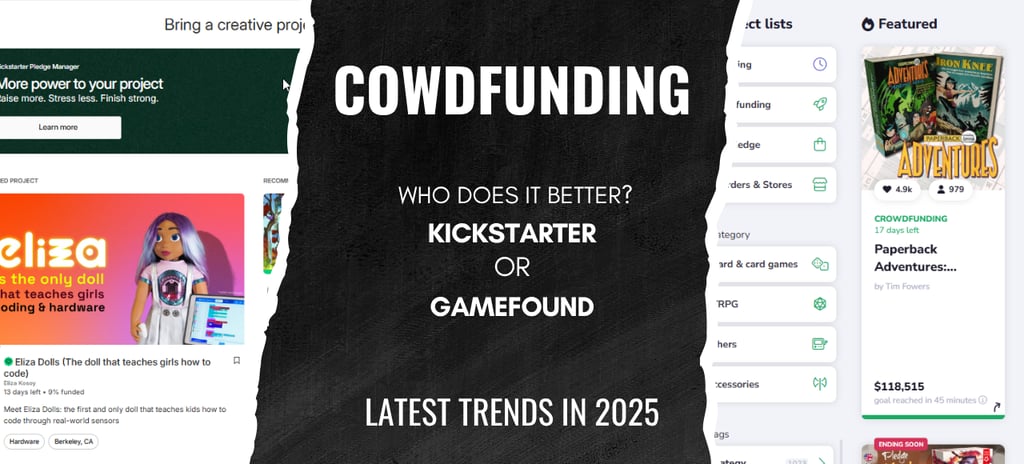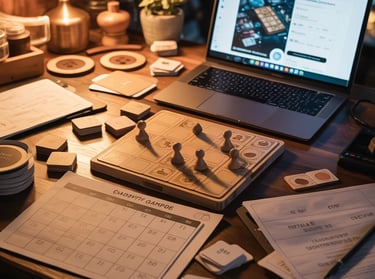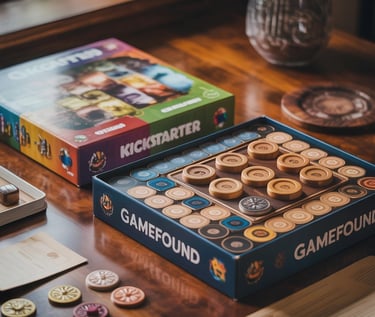Enjoy 10% off on most realm products when you buy direct! Enter code: dtc10
Crowdfunding Tabletop Games in 2025: How it Works and Why Gamefound is Gaining on Kickstarter
Remember when getting a board game published meant convincing a major publisher to take a chance on your idea? Those days are increasingly becoming a relic of the past. Over the last decade, crowdfunding has fundamentally transformed how tabletop games reach our tables.
INDUSTRY NEWS
Brad Shirley
6/20/20256 min read


The Crowdfunding Revolution in Tabletop Gaming
Remember when getting a board game published meant convincing a major publisher to take a chance on your idea? Those days are becoming a relic of the past. Over the last decade, crowdfunding has fundamentally transformed how tabletop games reach our tables. In 2025, this revolution continues to evolve, with a significant shift in the platforms that creators and backers are gravitating toward.
At The Riverside Realm, we've watched this transformation with great interest. As not only creators of handcrafted gaming accessories but an aspiring game publisher, we're passionate about the tabletop industry and how games are brought to life. Today, we're diving into the crowdfunding landscape, explaining how it works, and exploring why Gamefound is rapidly gaining ground on the long-established crowdfunding champion, Kickstarter.
How Tabletop Game Crowdfunding Works
For those who do not know, crowdfunding is essentially a method of bringing a project to consumers by raising small amounts of money from a large number of people. In the context of board games, it allows designers to present their vision directly to potential players, bypassing traditional publishing gatekeepers.
Here's the typical process:
Campaign Creation: Game designers develop a prototype, create compelling marketing materials, set funding goals, and establish reward tiers for backers.
Launch and Promotion: The campaign goes live on a platform like Kickstarter or Gamefound, and creators promote it through social media, conventions, and standard marketing channels.
Funding Period: Most campaigns run for 30 days, during which backers pledge money in exchange for rewards (typically the game itself, plus possible add-ons or exclusives).
Success or Failure: If the campaign reaches its funding goal, the money is collected, and production begins. If not, no money changes hands (in all-or-nothing models) and the project is dissolved.
Production and Fulfillment: The successfully funded game goes into production, and eventually ships to backers, typically 8-18 months after the campaign ends.
The Major Players: Platforms Powering Tabletop Crowdfunding
Kickstarter: The Original Heavyweight
Since 2009, Kickstarter has been synonymous with crowdfunding, particularly in the tabletop space. With its all-or-nothing funding model, user-friendly interface, and massive audience, it's helped launch industry-defining games like Gloomhaven, Exploding Kittens, and Kingdom Death: Monster.
In many ways, Kickstarter built the modern tabletop crowdfunding ecosystem. Its "Projects We Love" designation and algorithm-driven discovery features have helped countless games find their audience. However, its broad focus across all creative projects means it isn't specifically optimized for the unique needs of only tabletop game creators.
Gamefound: The Specialized Challenger
Enter Gamefound, a platform built from the ground up specifically for tabletop games. Launched as a pledge manager in 2019 by Awaken Realms (creators of Tainted Grail and Nemesis), it evolved into a full crowdfunding platform in 2021.
What makes Gamefound special is its laser focus on tabletop gaming. Every feature is designed with board game creators and backers in mind, from sophisticated pledge management to detailed component previews.
Why Gamefound is Gaining on Kickstarter in 2025
The most fascinating development in the tabletop crowdfunding world is how quickly Gamefound has risen to challenge Kickstarter's dominance. Here's why this specialized platform is winning over creators and backers alike:
1. Purpose-Built for Tabletop Games
Unlike Kickstarter's one-size-fits-all approach, Gamefound offers tools specifically designed for tabletop games:
Component Preview: Backers can examine detailed digital renderings of game components
Multilingual Support: Critical for the global board gaming community
Rules Browser: Allowing backers to review game rules before pledging
Integrated Pledge Manager: Streamlining the often complex process of add-ons and shipping
"The difference is like using a Swiss Army knife versus a professional tool set," explains veteran game designer Marcus Chen. "Kickstarter does many things well, but Gamefound does one thing exceptionally."
2. Impressive Growth Trajectory
The numbers speak for themselves. In 2024, Gamefound's project funding jumped 49% to over $85 million. While still behind Kickstarter's tabletop numbers, the gap is closing rapidly.
Most telling is Gamefound's CEO's public goal to outperform Kickstarter in tabletop funding by the end of 2025—a target that seemed laughable just a few years ago but now appears increasingly plausible.
3. Higher Average Pledge Amounts
While Gamefound hosts fewer campaigns than Kickstarter, those campaigns tend to raise more money per backer. This suggests that the platform attracts more serious hobbyists willing to invest heavily in games they're excited about.
"We're seeing average pledges on Gamefound about 30% higher than on comparable Kickstarter campaigns," notes industry analyst Sarah Winters. "That's a significant difference that can make or break a campaign's success."
4. Creator-Friendly Ecosystem
Gamefound's integration of campaign management, pledge management, late pledges, and fulfillment in one platform drastically reduces administrative overhead for creators.
"When we switched from Kickstarter to Gamefound for our second campaign, we saved at least 15 hours per week just on administration," shares indie publisher Blackwood Games. "That's time we could put back into improving the game."
5. Focus on Premium and Deluxe Games
Gamefound has become particularly popular for campaigns featuring deluxe components and complex pledge structures. Games with numerous add-ons, expansions, and premium components benefit from Gamefound's robust tools for managing these elements.
This aligns perfectly with the industry trend toward premium tabletop experiences, where players increasingly value tactile quality and presentation alongside gameplay.
What This Means for the Future of Tabletop Gaming
As Gamefound continues its ascent, we're likely to see several important developments in the tabletop industry:
Increased Competition Benefits Everyone: With Kickstarter responding to Gamefound's challenge, both platforms will continue improving their offerings, benefiting creators and backers alike.
More Specialized Tools: Expect both platforms to develop increasingly specialized tools for tabletop campaigns, from 3D previews to more sophisticated pledge options.
Higher Quality Productions: The emphasis on premium components will continue, with games featuring more deluxe elements to justify their crowdfunding prices.
Greater Transparency: As backers become more experienced, they're demanding greater transparency in campaign pages, timelines, and risks—something both platforms are encouraging.
Enhancing Your Crowdfunded Games
At The Riverside Realm, we've noticed that many of our customers come to us after receiving their crowdfunded games, looking for ways to enhance their premium tabletop experiences. That's why we create handcrafted accessories designed to complement the high-quality components found in today's crowdfunded games.
Whether it's custom score trackers that replace flimsy cardboard, game storage solutions that protect your investment, or game room decor that showcases your passion on game night, we believe the crowdfunding revolution in tabletop games deserves accessories of equal quality and care.
Final Thoughts: The Road Ahead
Crowdfunding has matured from a novelty to the dominant model for bringing innovative tabletop games to market. As Gamefound challenges Kickstarter's long-standing dominance, we're witnessing not just a battle between platforms, but an evolution in how games are created, funded, and enjoyed.
For players, this competition means more choice, better campaigns, and ultimately superior games. For creators, it offers more specialized tools and opportunities to connect directly with their audience. And for accessory makers like us, it represents an exciting opportunity to complement these premium games with equally thoughtful accessories.
Whether Gamefound achieves its ambitious goal of overtaking Kickstarter by the end of 2025 remains to be seen. But one thing is certain: the passionate community of tabletop gamers will be the ultimate winners in this friendly competition.
What are your thoughts on the changing crowdfunding landscape? Have you backed projects on both platforms? We'd love to hear about your experiences join and post in our Facebook Page!
Brad is the founder and president of The Riverside Realm, creating premium wooden and 3D printed accessories for board game enthusiasts. When not crafting the perfect gaming accessory, he's probably backing too many games on both Kickstarter and Gamefound.


The magic of crowdfunding lies in its ability to validate market interest before a creator has to commit to significant production investments. While this is great for the games creator, by utilizing crowdfunding in the early development stages a natural community forms around game. This community can be vital in providing feedback and suggestions that shape the final product.


Indiegogo and Others: Alternative Options
While Kickstarter and Gamefound dominate the conversation, other platforms like Indiegogo also host tabletop campaigns. Indiegogo offers flexible funding options (keeping pledged money even if goals aren't met), but its community skews more toward tech gadgets and innovations, making it less ideal for board games.
The Riverside Realm, llc.
811 Riverside Ave,
Wellsville, Oh 43968
Brad@riversiderealm.com
234-736-1812
© 2025. All rights reserved.
Frequently Asked questions